- Home
- Francine Mathews
Death in Rough Water Page 3
Death in Rough Water Read online
Page 3
She closed her eyes and considered dinner at the Folgers’ with relief and something else—a renewed conviction. Hysterical or no, her fears would have to be shared. She could not stand another night of brooding about her father’s murder.
Chapter 2
Adelia duarte closed her door on the stormy dusk just as Merry Folger was drawing up to the geranium-colored portal of Peter Mason’s two-hundred-year-old saltbox. The house, with its hundred acres of cranberry bog and sheep pasture, was tucked into the island’s moors and surrounded by Nantucket Conservation Foundation lands, but despite its isolation in the late-afternoon gloom, it looked snug and welcoming. Yellow light shone from the windows, the scent of woodsmoke spiraled from the chimney—and Merry’s spirits, dampened by funereal thoughts and contagious melancholy, immediately rose. She turned off her car’s ignition and thrust open the door.
She was still wearing the quiet navy suit she’d thought proper for the Mass, and her pumps sank into the crushed quahog shells that covered the drive. She jumped quickly to the brick steps and rang the bell, feeling the sudden rush of anticipation that always preceded the sight of Peter. Ney was barking from somewhere within the house. That meant Peter was probably home.
“Detective!”
Not Peter, but Rebecca the housekeeper, her close-cropped iron-gray hair as grim as ever, her blue eyes snapping with interest, and her smile wide with pleasure. Rebecca, who would love to see Peter settled with a nice young woman and had been trying to get Merry to the house on various pretexts all year. First, the laundry-room window she thought was forced, and demanded that Merry inspect herself—a window that clearly had not been raised or otherwise violated in years. Next, the matter of the missing suitcase, f illed, Rebecca swore, with her most personal documents, that had disappeared from the barn storage room. The suitcase was discovered not much later, safely shelved in the stone depths of the storm cellar. After that, Rebecca started talking about her failing memory, and Merry made a point of stopping at the farm without being summoned—knowing how long the gray island winters could be for a woman of Rebecca’s years, living with only Peter and his foreman, Rafe da Silva, for company.
“Now isn’t that the prettiest thing!” Rebecca said, admiring her suit as she stood aside to allow Merry across the threshold. “You didn’t f ind that on-island.”
“J.Crew,” Merry said automatically. “I’ve just been to Joe Duarte’s funeral.”
“That was today?” the housekeeper said. “And I never remembered. I’ll have to send that poor girl a card all the same. You’ll be wanting to see Peter, of course,” she said briskly. “He’s on through to the study.”
But the sound of voices had drawn Peter Mason from his f ire, and when Merry turned toward the hallway leading to the warmth of his favorite room, she found him leaning against the doorjamb, index f inger in his book, studying her quietly.
“Merry,” he said. “What a pleasure.” The way he said the f inal word made her catch her breath and f lush to her black eyebrows, but he’d already turned back into the room and couldn’t possibly have noticed. She followed him and took the seat he offered, feeling the comfort of the place steal over her in warm waves. The f ire was of driftwood, its multicolored f lames cheerily psychedelic, and the sofa was bright against the storm beyond the windows. Rebecca had disappeared, and Merry felt herself relax into the place and the moment with something like relief. She hadn’t realized how tense the funeral and the crowd at Adelia’s had made her.
“I’ve been having scotch,” he said. “Something about the rain and the damp—when it’s raw, I need to drink something earthy. Like bourbon. Or this. What’ll it be?”
“A glass of red, if you’ve got it.” A few months ago she’d have refused even a beer, conscious of how it might look for a cop to drink on the job; but she wasn’t on the job today, and Peter Mason was no longer a suspect in his brother’s murder. “I just got out of Joe Duarte’s funeral.”
“Of all days,” Peter said, glancing out the window. “My own father was buried on a raw day in January. You never forget it.”
“Particularly when you’ve no body to bury,” Merry said. “Just word of a death you tell yourself to believe.” She accepted the glass of Pinot Peter handed her and let the f irst sip pool on her tongue. Like the last warm days of September captured in a bottle. She sighed and leaned back into the sofa’s softness.
“How’s your friend taking it?”
“Del? Like a rock. Mostly because everyone who knew her dad is hoping she’ll fall apart. The outcast, returned too late—you know.”
He slid into his club chair. “Sometimes this island is way too small.”
“She knew what it would be like.”
“Were they ever close?”
“Once. After Del’s mother died, she and Joe were all each other had. That’s one reason Joe took it so hard when she got pregnant and left. Although he’d stopped speaking to her by that time.”
Peter’s brow was furrowed. “Because of the baby?”
“Because she wouldn’t tell him whose it was. She probably knew he’d go after the guy with a shotgun and try to make him marry her, and I doubt Del wanted to marry Sara’s father. If she had, she’d be married by now. She wanted to have the baby in peace and ignore all the questions. That wasn’t Joe’s style.”
“He probably died regretting it,” Peter said.
“Like Jose da Silva will.” Portuguese patriarchs tended to be implacable. The father of Peter’s foreman, Rafe da Silva, had rejected Rafe when he was falsely accused of murder. Despite the passage of six years and Rafe’s imminent marriage, the two still had not spoken. “That’s partly why I’m here.”
One of Peter’s eyebrows rose. “I’d hoped it was to drink with me—since I hadn’t heard Rebecca lost a silver tea service or a pair of pearl earrings. But never mind. Tell me about Rafe while I ref ill your glass.”
Merry studied his back as he stood at the bookshelf-cum-bar, decanting the wine with practiced ease, and wondered what he did poorly. She had never witnessed an awkward moment in Peter Mason’s life—except, perhaps, those f irst few after the discovery of his brother’s body in his f looded bog. He had been enraged and embittered then, at Rusty Mason more than anyone else, and anger made him careless with words. She hoped she wasn’t going to make him angry now.
“How much do you depend upon Rafe?”
He stoppered the Pinot bottle. “As a friend or a foreman?”
“As a foreman, I suppose.”
“I rely on him increasingly. I doubt I’ll replace him entirely if and when he leaves me.”
“You seem certain he will,” she said, feeling relieved.
“Change is a norm, Merry.” His gray eyes went f lat and cold for an instant, and he sat down again opposite her. “I never expect to hold the people I care about for very long.”
She took the ref illed glass he offered without comment. Peter’s fear of loss disturbed her. It was too much like her own.
“So I have a thorough knowledge of every stage of production at Mason Farms,” he continued. “It’s vital, and it’s frankly impossible to run this place unless you have your f inger on its pulse. I make sure I do—if only so I don’t look stupid every time Rafe takes a vacation.”
“How busy are you right now?”
“Not terribly. The vines have f lowered, and the fruit should set fairly soon. After that it’s just a matter of irrigation and time. The harvest isn’t until fall. The sheep are past lambing, and the shearing, again, can wait for September.” He set down his glass. “Now. Tell me what you want from Rafe.”
“Adelia needs somebody to crew for her.”
“To crew for her?”
Merry nodded. “I know. It’s unusual. The most women are ever allowed to do on a f ishing boat is cook, right? I’m sure Rafe thinks so. But he’s the best person I could
think of. He’s dying to get back on the water—at least, I imagine he is. Every ex-f isherman I know dreams of it for the rest of his days. Del’s going to harpoon swordf ish—”
“She’s going to what swordf ish?”
“Harpoon them.” Her voice sounded small even to herself. “You don’t know her, Peter, so this must seem crazy. But trust me. It’s not.”
“And a woman wielding a barbed hook on a stick needs somebody to steer the boat, I’m thinking?”
“That’s about it.”
“I can’t see Rafe as a glorif ied taxi driver.”
“I just wanted your permission, as his employer, to ask,” Merry said. “It would just be part time. A few days when you can spare him. Adelia knows Rafe from way back. She’d be thrilled to have his help.”
“By all means, ask,” Peter said. “Just don’t be hurt if he laughs in your face.”
Merry found Rafe drawn up to his desk in the barn loft, dark head bent over a pile of paperwork. He was listening to music, one reason he hadn’t heard her shoes on the barn’s wooden stairs.
“Girl Scout! How ya doin’?”
Her childhood nickname. “Not bad. You?”
He spun around in the chair. “Saw you at the funeral.”
“But didn’t bother to say hello.”
“I got outta there fast. Didn’t want to run into my dad. He and Joe went to school together.”
“Joe’s entire f irst-grade class must have been in the living room. I said hello to Jose. He looked good.”
“Yeah, pride agrees with the Old Bastard,” Rafe said, slapping a sheaf of papers into a neat, squared pile. “Amazing we can live on an island of six thousand people and avoid each other. But da Silvas were always masters when it came to blood feuds. My great-great-grandfather kept one running in Portugal for three generations.”
Merry pulled up a chair. “Do you miss it, Rafe?”
“Fighting with my father? Not at all. I’m smarter than that, Merry.”
“I meant f ishing for a living. Going out with the boats in the dark.”
“All the time,” Rafe said. “Even though I know my dad sold his boat to a guy trawling out of Hyannis. I keep thinking it should’ve been mine.”
“It should have,” Merry said.
“What’s in the blood doesn’t die easy. Particularly pride.”
“I know.” Merry looked at her shoes. A scalloped stain on the leather showed where the rain had done its work. “Del is thinking of staying here,” she said.
“Yeah? She gonna work for Tom Baldwin again?”
“She’s talking about swordf ishing.”
Rafe gave a short bark of laughter.
“Harpooning, actually,” Merry continued, “off the Praia.”
“Nobody’s sending boats out after sword in these waters, Merry. Most of ’em are picked up off Long Island. Del won’t make a decent living. Then she’ll be scrambling for a part-time job in high season, when they’ve been promised to kids from Ireland and the Dominican Republic for months. She’ll be desperate.”
Merry knew what he meant. Local summer jobs increasingly went to foreigners who applied through overseas agencies. Some had work permits, some did not. The Nantucket police couldn’t do the work of the Immigration and Naturalization Service. So her father told his off icers to look the other way, and restaurant owners paid f ifteen bucks an hour for dishwashers. Like everything imported, summer help was pricey.
“Who’s she gonna get to crew for her, anyway?” Rafe continued. “It’d be different if she had a brother. But no guy is gonna work for a Jonah.”
A Jonah. Seaman’s term for landlubber—or worse, a bad-luck curse. It was drawn from the miserable story of Jonah and the whale. All women were by def inition Jonahs to commercial f ishermen. They were some of the last champions of sexism.
“I thought maybe you might,” Merry said quickly.
“Me?” Rafe stared at her in horror. “You crazy, Girl Scout? I wouldn’t set foot on that boat if it were dry-docked and for sale. I don’t miss f ishing that bad.”
“Come on, Rafe. At least give it a thought.”
“No.”
“Flat-out?”
“You heard me. I’d be the laughingstock of every self-respecting guy in the harbor. And then there’s Tess. Took me long enough to get her to the altar as it is. I don’t want her catching me with another woman a month before the wedding.”
“Peter thinks it’s a great idea,” Merry said.
“I just bet.” Rafe laughed outright. “Get him on the boat then, he’s so sensitive with women.”
“Rafe—” She heard the pleading note in her voice, and started over. “Maybe with time Del will f ind somebody permanent to crew for her. But for now you could do a favor for an old friend. And you’ll give her credibility. A little bit of acceptance. Until she gets her head above water and decides whether she’s any good at this.”
Rafe folded his tanned arms across his chest and stared at her quizzically. “You’re trying to make me feel bad so I’ll do something I don’t want to. You’ll be pulling out all the stops and talking about Billy next.”
Billy. The IED that killed Merry’s brother in Iraq had been meant for Rafe. But it was the foreman who brought it up all the time, not Merry.
“Nobody wants to give Del a break. You know what that’s like. They’d rather she failed. But you, Rafe—independent, respected, mature enough to work with a woman—you can give her one.”
“You’re way too emotional to be a cop, you know that?” he said.
“Yep.”
He rolled a pen under his f ingers. “Just for a few days?”
“You know you’d love to be out on the water again.”
“Might be fun to see the look on the Old Bastard’s face.” He turned back to his papers. “I’m not saying yes. I’m just not saying no.”
Chapter 3
Ralph Waldo Folger lifted the lid from his beloved spaghetti sauce, breathed deeply of garlic, beef, and tomatoes, and sighed. The recipe was his wife’s, mastered during the f inal years when arthritis had swollen Sylvie’s hands and crippled her legs, barring her from the things she had loved—needlework, garden, and kitchen, in that order. The slow illness, Ralph had told Merry, was God’s way of teaching him how to live without her grandmother; had she been taken from him abruptly, he’d have been lost. Instead, they continued to collaborate, in a sense, every time he unfolded one of the yellowed slips of paper on which she had recorded her secrets in her spidery Swedish hand. And so it was that on a night of terrible spring storm the Thursday before Memorial Day weekend, he could grace the house on Tattle Court with the mouth-watering smell of Bolognese.
In contrast to the unrelenting rain and the early dark, the kitchen was warm and f illed with a soft golden light. It was a square space nearly one hundred and f ifty years old, with somewhat newer wooden cabinets and white-enameled f ixtures overlaid with a faint yellowing from age. The walls were painted a strong sea blue that looked shady in summer and cozy in winter, while the f loor was of oak that creaked and sloped with the settling of the house. In the center of the room was a large oval table, scarred from decades of use, where the Folgers read their morning papers, piled their discarded mail, left purses and hats and crumpled brown bags of forgotten lunch. As a child, Merry had done her homework here, and Sylvie had put up jar after jar of brightly colored preserves. The room was the soul of the house.
A sudden shriek nearly jolted Ralph Waldo out of his shoes—Sara Duarte, exercising her lungs. Her small hands waved a fork and spoon in midair, and her legs, clad in bright green jersey, were energetically kicking the rungs of the aged Folger high chair. “Skettie!” she crowed. “Sara want skettie!”
Ralph Waldo smiled, his strong teeth a bright slash through his already tanned skin. Sara stopped kicking and waving, me
smerized by the sight of him. He knew how utterly strange he must seem to her—six feet tall, white-haired, his brows bristling over a trimmed beard—a Santa in sports clothes, like a card sent from a retirement community in Florida. But Sara Duarte was too little to know about Santa yet. Her wonder was wordless.
“Meredith Abiah!” he bellowed in the general direction of the stairs. “There’s a child needs feeding!”
A pause in distant conversation and a hasty clatter of footsteps. The girls were coming down.
He had never gotten past thinking of them as the girls. As children they had tucked themselves into Merry’s dormer room to gossip and share secrets. That they were both over thirty now and long past the age of slumber parties meant little to Ralph Waldo. Time had ceased to serve as a responsible marker of age. He felt as f it as he had at sixty—well, perhaps as f it as he had at seventy—and so the girls’ passage through their twenties had happened imperceptibly. Even this little one seated at his table, impatient for spaghetti, did not age Adelia in Ralph Waldo’s eyes. Sara was simply another girl, with years and years before her, and Ralph could think of nothing more delightful to have in the house.
Merry had tackled him in the living room before Del and her baby arrived that evening.
“I’ve got a favor to ask, Ralph.”
“Does this have to do with Adelia, perchance?”
“How do you envision your summer?”
“My summer?” His favorite season. The time of tomato plants and bluef ish on the grill and early-morning walks to Bartlett’s produce truck at Federal and Main, followed by a satisfying lunch and nap in his Adirondack chair. “Same as always, I expect. Puttering at this, meddling with that.”

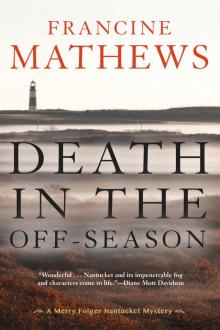 Death in the Off-Season
Death in the Off-Season Death in Rough Water
Death in Rough Water The Alibi Club
The Alibi Club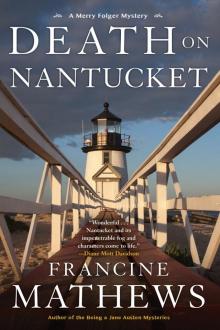 Death of a Wharf Rat
Death of a Wharf Rat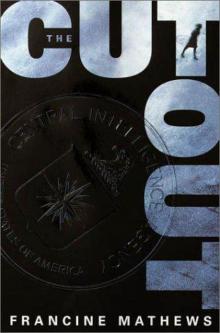 The Cutout
The Cutout The Secret Agent
The Secret Agent The Cutout cc-1
The Cutout cc-1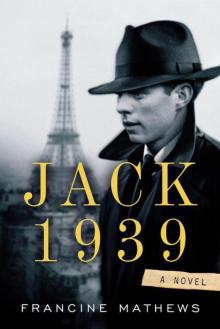 Jack 1939
Jack 1939 Death in a Cold Hard Light
Death in a Cold Hard Light Blown
Blown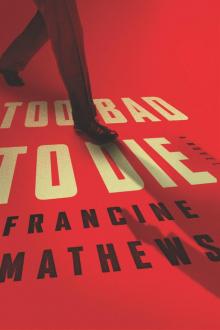 Too Bad to Die
Too Bad to Die